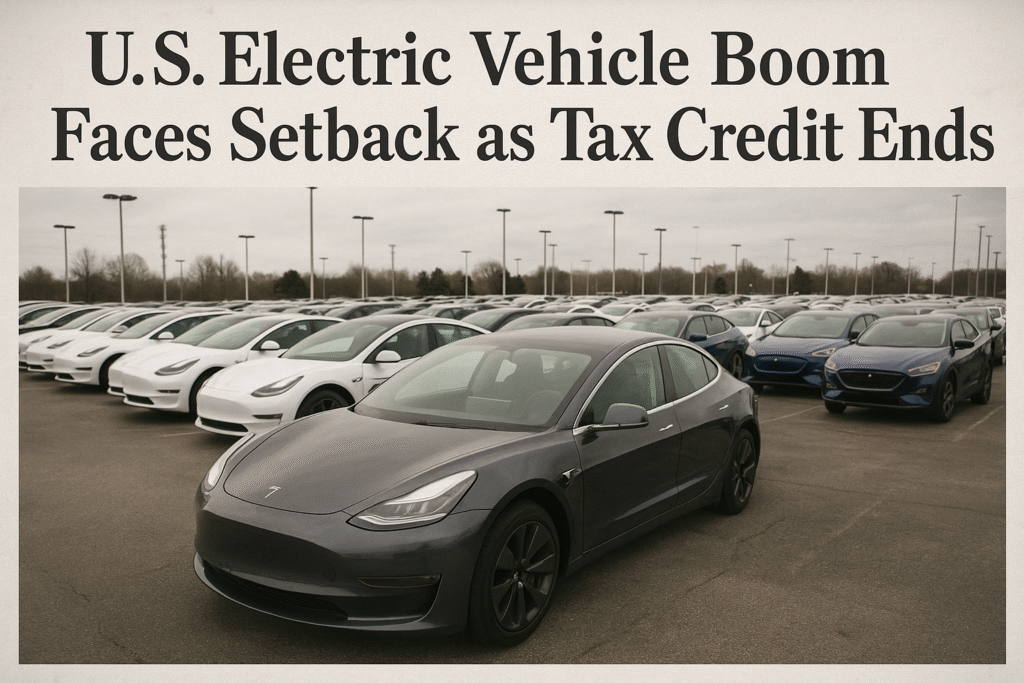By Harshit Washington, October 5, 2025 – 6:00 AM EDT
EV Sales Surge Ahead of Government Incentive Expiry
Electric vehicle (EV) sales in the U.S. appeared to be gaining strong momentum, with battery-powered car sales surpassing 1.2 million last year—more than five times the total from 2021. Hybrid vehicle sales also tripled, according to S&P Global Mobility, and EVs accounted for a record 10% of total U.S. car sales in August.
Leading automakers, including General Motors, Ford, and Tesla, reported record EV sales in the third quarter, providing a bright spot for an auto industry still grappling with high interest rates, inflation concerns, tariffs, and economic uncertainty.
Surge Driven by Expiring Tax Credit
Analysts, however, caution that the recent boom was largely driven by a rush to take advantage of a government subsidy offering up to $7,500 off the purchase of battery, plug-in hybrid, or fuel-cell vehicles. That tax credit expired at the end of September, leading industry leaders to predict a sharp decline in demand.
Ford CEO Jim Farley said at an event on Tuesday, “It’s going to be a vibrant industry, but it’s going to be smaller, way smaller than we thought.” GM CFO Paul Jacobson echoed the sentiment, noting that it may take time to gauge how quickly buyers return to the market.
U.S. Lags Global EV Adoption
Despite the gains, U.S. EV adoption remains below levels seen in other major markets. In the UK, nearly 30% of new car sales were electric or hybrid last year. In Europe, EVs accounted for about one in five sales, while China led globally, with nearly half of all cars sold being electric.
Some smaller markets, such as Norway and Nepal, have achieved even higher EV penetration. Adoption in Latin America, Africa, and parts of Asia remains lower but is growing rapidly.
Policy and Price Challenges
Government policy has played a major role in shaping EV adoption. The Biden administration pushed for increased take-up through stricter emissions rules, fleet purchases, investment incentives, charging infrastructure, and the $7,500 tax credit.
By contrast, President Donald Trump has moved to repeal many of these measures, including the credit, arguing that buyers should choose EVs voluntarily. Trump’s policies also include higher tariffs on imported cars and parts, which have effectively kept lower-cost Chinese EVs, such as BYD, out of the U.S. market.
Average U.S. EV prices remain high, with Kelley Blue Book reporting an average transaction cost of over $57,000 in August—16% above the overall car average. Entry-level models like the Nissan Leaf start around $30,000, compared with several sub-£20,000 options in the UK.
Market Outlook
Automakers face a challenging period as incentives vanish and tariffs remain in place. Hyundai plans to offset the loss of the tax credit by reducing prices on its Ioniq EV line, while Tesla has signaled higher lease costs. S&P Global Mobility analyst Stephanie Brinley predicts a difficult 2026, with overall car sales expected to decline by roughly 2%.
Katherine Yusko of the American Security Project described the end of subsidies as “a big hit to the EV industry,” noting that U.S. automakers now face the challenge of catching up to global competitors.
Brinley added a note of caution: “Saying that we’re behind assumes that EVs are the only solution, and it’s a little early to say that.”

